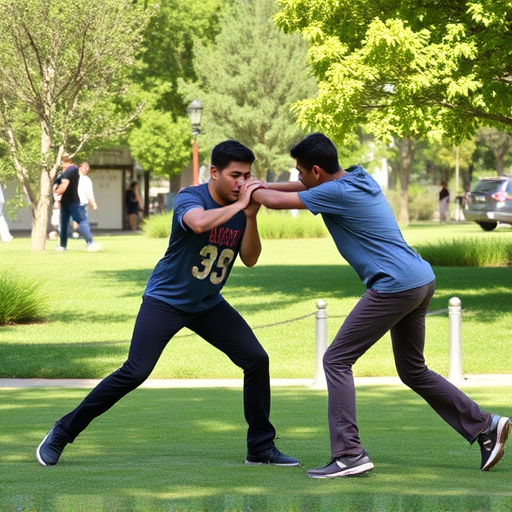Personal safety on college campuses is paramount, requiring students to be proactive in mitigating risks like dark areas, deserted buildings, and late-night walks. For optimal defense, students should learn basic self-defense techniques, understand campus security protocols, and trust their instincts. Educational institutions play a crucial role by implementing robust security measures and conducting regular drills. Self-defense workshops, counseling services, and peer support groups empower students to enhance their security and create a supportive network, fostering healthier and safer campus lives.
“Ensuring personal safety is paramount for students navigating the complexities of college life. This comprehensive guide delves into the critical aspects of safeguarding yourself on campus. From understanding evolving risks and learning essential self-defense skills, to fostering a proactive environment through institutional measures, we explore holistic strategies. Furthermore, we highlight valuable resources and support systems designed to enhance student well-being, emphasizing the importance of self-defense for college students in today’s dynamic academic landscape.”
Understanding Personal Safety Risks on College Campuses
Personal safety risks on college campuses can vary significantly from school to school, but certain common issues often surface. Students need to be aware of their surroundings and take proactive measures for their self-defense. Dark alleys, deserted buildings, and late-night walks are potential hazards that require vigilance and preparedness.
Understanding these risks is the first step towards mitigating them. College students should familiarize themselves with campus security protocols, emergency contact numbers, and safe routes. Equipping oneself with basic self-defense techniques can also empower students to handle unexpected situations effectively.
Essential Self-Defense Skills for Students
In today’s digital era, awareness of personal safety is paramount, especially for college students navigating bustling campuses. Beyond reporting and avoidance strategies, equipping oneself with essential self-defense skills can empower students to protect themselves in unexpected situations. Basic self-defense techniques like hand strikes, kicks, and joint locks may seem intimidating, but learning them provides a sense of control and confidence. These skills are not about becoming aggressive but rather about neutralizing threats effectively while creating space for escape.
College students can access numerous resources, including campus safety programs and community classes, to learn these vital self-defense techniques. Understanding how to defend oneself physically is just one aspect; awareness of surroundings, trusting one’s instincts, and knowing when to seek help are equally important components of personal safety. By integrating these strategies into their daily lives, students can enhance their security and peace of mind while enjoying the full experience of college life.
Creating a Safe Environment: Proactive Measures on Campus
Creating a safe environment is paramount for ensuring personal safety among students on campus. Educational institutions play a crucial role in fostering security through proactive measures. Implementing robust security systems, such as surveillance cameras and access control measures, can deter potential threats and enable swift response to any incidents. Regularly conducting security drills and training sessions on self-defense for college students empowers them to take charge of their safety.
Beyond physical security, promoting a culture of awareness and preparedness is essential. Encouraging students to stay vigilant, report suspicious activities, and follow campus safety protocols contributes to a collective sense of security. Integrating self-defense workshops into student life not only equips individuals with practical skills but also instills confidence in dealing with unforeseen situations. These proactive steps collectively create an environment where personal safety is prioritized, fostering peace of mind for students as they navigate their academic journey.
Resources and Support for College Students' Well-being
College students often find themselves navigating a new and sometimes unfamiliar environment, which can make them more vulnerable to personal safety risks. Fortunately, many colleges and universities offer a range of resources and support services designed to enhance student well-being. These include workshops and training sessions on self-defense tactics specifically tailored for college students, enabling them to better protect themselves in various situations.
Additionally, counseling and mental health services are readily available to help students cope with stress, anxiety, and any personal safety concerns. Peer support groups and community outreach programs also play a vital role in fostering a sense of security and connection among students. By leveraging these resources, college students can proactively ensure their personal safety and create a supportive network that promotes a healthier and more secure campus life.
